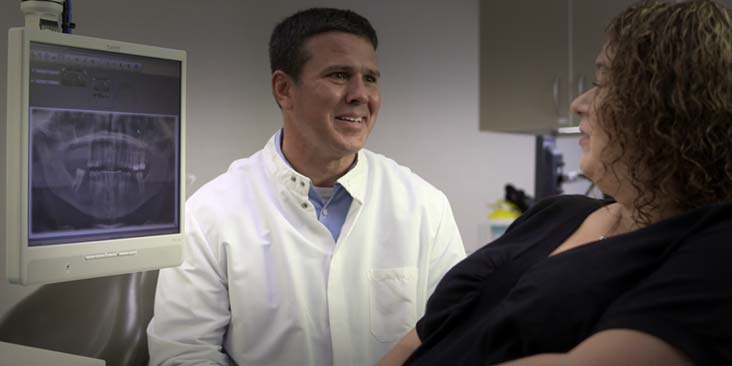
Oral Cancer
How Common is Oral Cancer?

According to the American Cancer Society, there are nearly 50,000 new cases of mouth, throat and tongue cancer diagnosed each year, and the average age of those diagnosed is 62.
How do you Prevent or Identify Oral Cancer?
When you visit a Dental Associates dentist, an oral cancer evaluation is part of the routine exam. They’ll look at your lips, jaws, cheek lining, gums, the front part of your tongue, the floor of your mouth beneath your tongue, the hard palate that makes up the roof of your mouth and your throat. As with gum disease, early stages of oral cancer typically don’t cause pain, so the earlier oral cancer is detected, the greater the chance of survival.
Contact your dentist if you notice any of the following, as they may be symptoms of oral cancer:
- Sores, irritation, rough spots, lumps, or red or white patches in the mouth
- Velvety white, red, or speckled (white and red) patches in the mouth
- Unexplained bleeding in the mouth
- Unexplained numbness, loss of feeling, or pain in any area of the face, mouth, or neck
- A soreness or feeling that something is caught in the back of the throat
- Difficulty chewing or swallowing, speaking, or moving the jaw or tongue
- Hoarseness, sore throat or change in voice that does not go back to normal
- Ear pain
- A change in the way your teeth look or dentures fit
- Loose teeth
Tobacco and Oral Cancer
Smoking and chewing tobacco are the major causes of oral cancer. All tobacco products, including cigarettes, cigars, pipe tobacco, chewing tobacco, and snuff, contain toxins and carcinogens which are poisonous substances and cancer-causing agents. The more you smoke or chew, the higher your risk for getting oral cancer.
The primary risk factors for oral cancers are tobacco and excessive alcohol consumption, but the human papilloma virus (HPV) has been associated with the increase in throat cancer in non-smoking adults. According to the Center for Disease Control, as many as 60 to 70 percent of the neck, throat and tonsils may be linked to HPV, and many of these may be caused by a combination of tobacco, alcohol, and HPV.
When you visit a Dental Associates dentist for your regular checkup, an oral cancer evaluation is part of the routine exam. We encourage you to answer honestly when your dentist asks questions about your alcohol and tobacco use, as this will help evaluate your risk.
Besides brushing, flossing and seeing your dentist regularly, quitting smoking and tobacco products, as well as reducing your alcohol consumption, is key to preventing oral cancer. Your dentist can help offer resources and even medication to help you quit. When you quit using tobacco, you’ll be at less risk for gum disease, bad breath, stained teeth and cancer. Learn more about tobacco and oral health.
Our Services
Dental Associates offers complete family dentistry plus specialty services like orthodontics, oral surgery, and dental implants. Click to learn more.
Dental Associates Locations
We have over a dozen convenient locations in Wisconsin. From Kenosha and Racine, up through Milwaukee, Fond du Lac, and Appleton to Green Bay.

